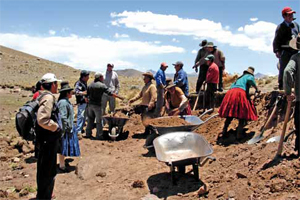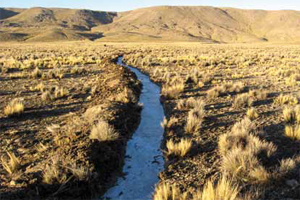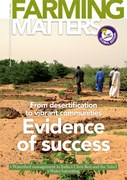The combination of a degraded landscape and climate change is having a severe impact in many places. In the Peruvian Andes, a water harvesting approach is proving to have positive results – especially when the construction of dams and canals goes hand in hand with an approach that leads to stronger local organisations and the involvement of all villagers and support from other local stakeholders.

DESCO is a Peruvian NGO that has been working in different parts of the country for almost 50 years. Since 1985 it has been supporting farmers and alpaca rearing families in the country’s southern Andes. Farmers in this area depend on the commercialisation of alpaca meat and wool.
For more than 10 years DESCO focused on finding new market opportunities and on the possibilities of adding value. The southern Andean region is one of the parts of the country where poverty levels are highest and this is combined with severe land degradation.
Different studies conclude that the latter is mostly the result of disappearing vegetation cover, and a result of increasing population and animal pressure. This is the main reason why, in 1996, DESCO decided to support water harvesting projects.
The need to harvest water comes from the need to improve, or at least stop the degradation of the habitats where alpacas live. In addition to severe losses in the mountain soil’s fertility, climate change is easily visible in this region: the glaciers which feed all the rivers, and the snow on the mountaintops, are noticeably getting smaller – which means less and less water flowing down into the valleys.
One strategy to cope with this problem is to try to store part of the water falling during the rainy season and use it during the dry months. A total of 137 small dams have been built in the past 15 years, each of which, on average, can hold 65,000 m3 of water. Starting in the province of Caylloma, the benefits are now being seen in more than 100 high-altitude localities in the Arequipa, Puno and Ayacucho regions.
More than infrastructure
A first step is the identification of the best place to build a dam, making use of a natural depression or a small lake where large volumes of water can accumulate. Next comes the collection of the necessary materials (sand, stones and cement; not always easily available at 4,000 m above sea level) and the excavation and construction works. Yet, water harvesting does not only mean building dams and canals.
In addition to the necessary infrastructure, our work also focuses on developing the necessary skills and capacities to build and manage each system. This involves ensuring the participation of all the villagers in order to secure their sense of ownership and responsibility.
Once a location is selected, the process starts with an agreement that clearly specifies all the roles and responsibilities. At first, all the costs were equally divided between DESCO and the local organisation, but the positive results have motivated the municipalities and regional governments to cover up to 50% of all costs.
While DESCO takes responsibility for all the construction works, the communities contribute with local materials and labour, and all the villagers agree to join the local organisation. This is important in order to ensure a fair and equitable distribution of water throughout the year, and the sustainability of the system of collecting, storing and distributing water.
During the past 15 years we’ve seen that the simplicity of the process ensures its replicability. We have also seen that, gradually, more and more villagers are becoming local engineers, contributing with their recently-acquired skills so that others villages can initiate a similar process.
Yet the success seen does not only depend on the dams and canals built, or on the capacity of building them. In each of the 137 cases, the local organisation plays a key role. The existing organisations are strengthened with the creation of an irrigation committee, with roles and responsibilities drafted in accordance to the national legislation, meaning that will be officially sanctioned and recognised by the authorities.
While the internal regulations have helped minimise the number of internal conflicts (among water users within one village), the official recognition has helped all users in their fight against third parties in need of water – most notably mining companies large and small-scale. Unfortunately, this problem is becoming more and more frequent in the mineral-rich Andes.
Water and more

The impacts of our work are not limited to the availability of water for irrigation and for household use. Very big changes have also been seen in the irrigated pastures. A detailed analysis was done in different villages (including Quenco Cala Cala, Cauca, Hanansaya and Toccra) where, 46 months after the water storage facility had been completed, plant density was more than 120% higher and the yields in terms of biomass were almost 200% higher.
Local biodiversity, the number of plant species and the number of birds, has also increased. And better pastures translate immediately into more animals (up to twice as many) and healthier herds. Villagers regularly mention that animals weigh more when born and that their survival rates are higher, all of which, directly, translates into higher incomes.
Many positive developments have also been seen in the local organisations, especially in terms of commitment and participation. In some cases, the creation of the irrigation committees has led to better resource management arrangements and fewer conflicts (for example, over the use of communal land). Local organisations have also benefitted form the interest shown by the authorities (municipalities and regional governments) and other institutions (e.g. local NGOs).
Recognising the benefits of a water harvesting approach, they are interested in working together towards higher yields, productivity and incomes – by paying special attention to the fight against desertification and land degradation.
Fernando Camiloaga Jiménez
Fernando Camiloaga Jiménez works as co-ordinator of the PRONUSA project at DESCO, Centro de Estudios y Promoción del Desarrollo.
E-mail: fcamiloaga@descosur.org.pe

